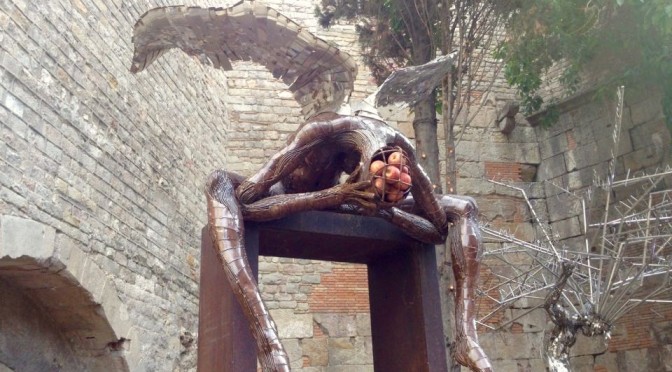Aquí teniu el post en Català.
There is so much to fear about a trip of this magnitude. The sheer amount of uncertainty and what-if, worst-case scenario thinking is maddening. News headlines scream all the terrible things we could face just about everywhere or anywhere we go.
But, like you, we have to filter out the news reports and keep moving through our day-to-day lives, hoping to remain unscathed. We’ll have to do the more or less the same thing when we’re walking.
Even so, now’s the time to ask some of the hardest questions we’ve ever thought about and figure out how to stare fear down.
The Big Fears
Some of our truly disturbing fears sound like this:
- What if we we’re victims of violent crimes, and get stabbed or shot during a robbery?
- What if we’re taken hostage?
- What if we’re taken hostage, and imprisoned, tortured and raped for an extended amount of time?
- What if they want to steal a kidney, or our liver?
- What if our abductors threaten to make an example of us while shouting into a video camera and wielding sharp knives that easily will slice our throats?
- What if we’re kidnapped, drugged and sold into the sex trade, trafficked to another country?
- What if find ourselves in a minefield?
- What if a bus or a car explodes, or we’re near a place where bombs were set? (Lluís, in fact, happened to be visiting a place where that happened once, and thankfully he’s still around to talk about it.)
- What if people show up in the middle of the night, separate us, drag us away and we never see each other again or know what happen to the other one?
- What if we get really sick, far from medical help and can’t make it in time to get treatment or medicine?
- What if we get hit by a truck, or are involved in a serious accident while walking somewhere along a busy road?
- What if we slide down the side of a mountain and are left paralyzed in a remote place?
- What if our appendix bursts?
- What if a poisonous snake or spider bites us?
- What if herd of wild elephants comes near our tent?
- What if tigers chase us, and catch us?
- What if we stumble into a drug cartel zone?
- What if we walk into something suspicious, covert operations we shouldn’t have seen?
- What if we’re arrested and unable to convince police or soldiers we we’re just innocently strolling by?
- What are all the things we’re leaving behind in the comfortable life we have now, and how hard will we say goodbye?
- What will we tell our families if something goes dreadfully wrong to one or both of us? How ill they handle the news?
This Q&A resembles spy movie plots with heroic protagonists who beat all the odds. These scenarios are not what normal people think about on a daily basis, and until now, many things like this never crossed our minds; some have, but not all. Instinctively, many of these nightmares feel like highly unlikely situations with a low probability of happening. Beyond the first glimpse, we simply don’t know what’s possible, and everything is possible.
The best we can do is take care and have a few precautionary tactics and disaster-relief strategies in our back pockets. We’re brushing up on our first-aid emergency medical and outdoor survival skills, and practicing self-defense moves. We’ll leave our families a long list of instructions of what they can do to help us if we get into trouble. And, we’ll carry with us a mini-contingency plan of how strangers can help us should a situation arise. In fact, for years, Lluís has this basic “Thank you for helping me, here’s what you need to know about me and who you can contact” travel note always within in arm’s reach. And, it came in handy one time.
To stave off initial panic, we’ll rely on our life and travel experience, our levelheaded and quick on-our-feet thinking, and an adrenaline rush to make necessary life and death decisions. We’re developing worst-case scenario exit plans and alternative plans for safety. And, once on the ground, we’ll be managing the trip in small pieces, looking ahead only one or two weeks and gathering information from locals about what they think is safe or unsafe in their neighborhoods, cities and provinces (how exactly we do that is a challenge in itself because we may not have common language). We want to trust that most people most of the time will be kind to us and help get us out of harm’s way. We know they are out there, because we’ve already found many of them around the world during other trips. Those that aren’t kind, we’ll still have to deal with and do the best we can to keep things under some sort of control.
But, really, how much more can we do to protect ourselves from the unknown? Not much. We’ll do what we can to find a safe out, at least on paper. How those well thought-out plans unfold the day bad luck finds us is will be anyone’s best guess.

The Little Fears
When thinking about these big, nerve-rattling questions gets too scary, we fix our thoughts on the more mundane ones many seasoned travelers worry about.
- How will we find and carry enough safe, clean drinking water every day?
- What will we eat, and what happens when it makes us sick, wrecks havoc on our digestive systems and stalls our trip for a few weeks?
- What mosquito or bacteria-related illnesses might down us for a while, and what vaccinations, over-the-counter medicines or avoidance techniques could help us sidestep problems?
- How much weight can we realistically carry, and what are the most crucial things that will go in our backpacks?
- How do we keep our feet and legs in good condition? How do we deal with everyday muscles aches and tiredness?
- How will we get from Point A to Point B? Will there be paths or dirt roads locals walk? We will have to walk along train tracks, or on the side of roads?
- What if we can’t get a visa to enter a country on the route? What if we get a visa, and won’t have enough time to cover the distance?
- How will we ensure we’ll never be robbed of all our money, and have a hidden stash somewhere?
- How will we let things go bump in the night and not let the boogeyman haunt our dreams?
- How will we motivate ourselves to keep going when it gets too physically or mentally tough?
- How will we not drive each other crazy with our small, but natural, differences?
If we let it, all these versions of fear could paralyze us. We hope not to let it.
Instead, we’re taking to heart something Jenn’s dad said when we told him about the trip.
“You’ll have this big plan about walking, but your mission every day should be to find a safe place to sleep.”
Finding a safe place to sleep every day seems like something we can manage, something within our reach. It’s the touchstone we can come back to when everything else seems too big or crazy making.
In the meantime, we’ll keep plugging away and plan what we can plan. We’ll get out heads, bodies and hearts strong. And we’ll throw ourselves into the great unknown with a fair amount of common sense, plenty of motivation and a giant dose of enthusiasm and rapture.







